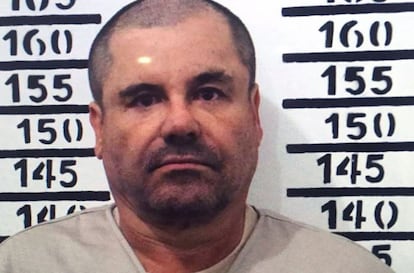“El Chapo” launches multiple appeals in bid to delay extradition to US
Presence of Sinaloa cartel boss in Mexico puts pressure on President Peña Nieto


Few things strike fear into the heart of Joaquín El Chapo Guzmán more than the prospect of spending the rest of his life locked away in a maximum security facility in the United States, and the drug kingpin is prepared to go to any lengths to prevent that from happening. In the three months following his arrest in Mexico, he has already presented seven appeals for protection against extradition. Over the same period he has lodged another 14 appeals aimed at improving the conditions he is being held under in prison, all of which have been dismissed by the Mexican authorities as delaying tactics. “All he needs to do is to accept extradition and the next day we’d send him to the United States,” says a source at the attorney general’s office.
Guzmán has been indicted in Brooklyn as well as Chicago, Manhattan, Miami and other cities where his cocaine ring is said to have operated in the United States. A 2014 indictment filed in a Brooklyn federal district court accuses Guzmán – who was recaptured in January after an audacious escape from prison last summer that deeply embarrassed the Mexican authorities – of helping to run the world’s largest drug-trafficking organization, the Sinaloa cartel.
All he needs to do is to accept extradition and the next day we’d send him to the United States
Mexico's attorney general’s office
New York would likely be the location for Guzmán’s trial because this is where Attorney General Loretta Lynch, who helped bring him to justice, had previously served as the US attorney for the Eastern District of New York, which is based in Brooklyn. “Under treaty agreements, the US can decide where the prisoner will go,” says a source at the Mexican public prosecutor’s office.
But without El Chapo’s agreement, it could take years before the US authorities get their hands on him.
That said, the Mexican authorities, beginning with President Enrique Peña, have made it clear that El Chapo’s extradition is a priority. Analysts say that even in the best-case scenario, he is unlikely to be shipped north before the year is out.
Political pressure
Guzmán has already managed to escape twice from jail in Mexico, and his continued presence in the country puts the government under pressure to prevent a third prison break. In response, the authorities have effectively created a prison within a prison at the El Altiplano high-security facility, within which he is constantly moved from one cell to another and is watched over round the clock by a team of 35 guards, who use specially trained dogs to check his food for poison.
Under such conditions, it seems unlikely he will be able to repeat the feat of escaping via another tunnel, as he did last summer, but his capacity for intimidation and corruption is a factor that the authorities will have to take into account if they want to hold on to him. At the first prison where he was held, Puente Grande, he bought off some 62 prison guards. An investigation is underway as to how many prison officials knew of the 1,500-meter tunnel 30 meters below El Altiplano.
The question of El Chapo’s extradition has also created political problems for President Peña Nieto
The question of El Chapo’s extradition has also created political problems for President Peña Nieto. During the first two years of his mandate, extraditions of drugs traffickers fell sharply, with Peña Nieto insisting in the case of Guzmán that he would first have to face Mexican justice before the United States could try him: “El Chapo has to stay here and finish his sentence; then I will extradite him, in around 300 or 400 years,” boasted former Attorney General Jesús Murillo Karam in 2014.
But El Chapo’s escape put an end to this policy, and Mexico is now keen to hand the prisoner over to the US authorities. What was initially interpreted as recognition of the failure of the country’s institutions and the country’s ability to keep a prisoner behind bars has now become a show of strength in the face of a powerful drugs trade and a skeptical public. El Chapo is aware of this and will do everything in his power to prevent his extradition.
Sign up for our newsletter!
EL PAÍS English Edition is launching a weekly newsletter. Sign up today to receive a selection of our best stories in your inbox every Saturday morning. For full details about how to subscribe, click here.
English version by Nick Lyne.
Tu suscripción se está usando en otro dispositivo
¿Quieres añadir otro usuario a tu suscripción?
Si continúas leyendo en este dispositivo, no se podrá leer en el otro.
FlechaTu suscripción se está usando en otro dispositivo y solo puedes acceder a EL PAÍS desde un dispositivo a la vez.
Si quieres compartir tu cuenta, cambia tu suscripción a la modalidad Premium, así podrás añadir otro usuario. Cada uno accederá con su propia cuenta de email, lo que os permitirá personalizar vuestra experiencia en EL PAÍS.
¿Tienes una suscripción de empresa? Accede aquí para contratar más cuentas.
En el caso de no saber quién está usando tu cuenta, te recomendamos cambiar tu contraseña aquí.
Si decides continuar compartiendo tu cuenta, este mensaje se mostrará en tu dispositivo y en el de la otra persona que está usando tu cuenta de forma indefinida, afectando a tu experiencia de lectura. Puedes consultar aquí los términos y condiciones de la suscripción digital.








































